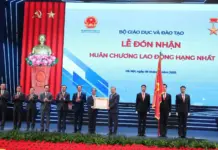Both localities promote sustainable tourism development, including ecotourism, agriculture, community, cultural and historical relics, and craft villages.
Dak Lak province has both rich and diverse tourism resources. This includes famous tangible cultural heritages such as gongs, stone instruments, bamboo instruments, longhouse architecture and tomb house architecture, in addition to typical festivals, such as the Elephant festival, gong cultural festival and a traditional worshipping ceremony.
Dak Lak is also blessed by nature with several majestic landscapes such as Dray Nur Waterfall, Dray Sap Thuong, Thuy Tien, Bim Bip, as well as large reservoirs with the diverse and typical ecosystem of Yok Don National Park, Chu Yang Sin National Park; Ea So Nature Reserve and Nam Ka Special-use Forest.
According to Nguyen Thuy Phuong Hieu – Deputy Director of the Department of Culture, Sports and Tourism of Dak Lak province, the locality is building elephant-related tourism products, bringing interesting experiences to tourists, such as: Watching elephants from afar; walking with elephants in Yok Don Forest, Lak Lake Environmental History Forest and Dak Lak Elephant Conservation Centre.
When tourism activities reopen, Dak Lak province identifies its strengths as eco-tourism and community-based tourism. In which, the province focuses on developing tourism models for the Ede and M’nong people. Besides the domestic market, Dak Lak has linked with many localities such as Da Nang, Quang Nam, and Khanh Hoa to attract international visitors.
Tourists walking on Ba Be Lake (Bac Kan).
Meanwhile, Bac Kan province is trying to create tourism linkages to build regional products. Recently, Bac Kan has participated in the tourism association programme between Ho Chi Minh City and the north-eastern provinces, the programme associated with Hanoi and the “Crossing the Heritage Lands of the Viet Bac Region” programme.
According to the leader of Bac Kan province, the locality continues to promote the advantage of historical tourism at the national special relic ATK Cho Don; cultural tourism is based on promoting 20 national intangible cultural heritages, notably the Then singing heritage recognised as the intangible cultural heritage of humanity.
In order to attract domestic and foreign tourists in the near future, Bac Kan will develop eco-tourism, resorts, cave exploration, agricultural experiences, and community tourism.




